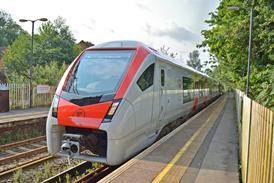AS BRITAIN’S Strategic Rail Authority dropped the ’shadow’ from its title on February 1, it became clear that a key part of its as yet unpublished strategy had fallen seriously behind schedule.
Of the 25 passenger franchises awarded when British Rail was privatised, 18 run for about seven years, and most of the rest for 10 to 15 years. Ignoring the tiny Isle of Wight franchise, the 18 expire in 2003 or 2004. When the SRA was set up in April 1999 in ’shadow’ form, and later absorbed the Office of Passenger Rail Franchising, a primary objective of its new Chairman, Sir Alastair Morton, was to replace the seven-year franchises quickly.
As originally negotiated, a common feature was subsidy that fell year by year and, in some cases, became a premium paid back to government. Sir Alastair’s first achievement was to persuade the Treasury to let him check this decline in subsidy. By re-bidding a smaller number of franchises for 20 years at a higher subsidy or lower premium, he argued that bidders could be persuaded to invest heavily not just in rolling stock, but in major infrastructure projects too.
Together with Railtrack’s ability to prosper, and thus accumulate debt, this formed the basis for an assumption in the government’s 10-year transport plan announced in July 2000 (RG 9.00 p541) that £34bn of the £49bn to be invested in the national railway by 2011 would be privately funded.
The position in mid-February was that the only investment deal closed by the SRA was a two-year extension of National Express Group’s Midland Main Line franchise from 10 to 12 years. This was done without re-bidding, and NEG agreed to acquire 28 new diesel trainsets capable of 200 km/h, ’probably’ with tilt, by 2006.
The first franchise to be formally re-bid was Chiltern Railways, the incumbent M40 Trains being declared preferred bidder in August 2000; £370m was to be invested in trains and infrastructure by 2005. But Railtrack Chief Executive Steve Marshall said on February 7 that ’financial stretch’ caused by the post-Hatfield re-railing programme (below) meant that the company could not agree to fund the work proposed by Chiltern. This put the signing of the replacement franchise on hold, and more seriously cast doubt on bids for other franchises that draw on Railtrack’s resources.
The next announcement by the SRA saw Govia defeat the incumbent, Connex, for preferred bidder status on the Network South Central franchise. This exposed another potential flaw in the process, for the SRA has no power to terminate existing franchises. Instead, Govia was invited by the SRA to negotiate financial compensation directly with Connex. They are still talking.
A decision on a preferred bidder is still awaited in the case of South West Trains. Incumbent Stagecoach is offering a 67% increase in commuter capacity into Waterloo, while GNER is offering to relocate Clapham Junction station and drive a new tunnel from there toward King’s Cross - perhaps to link up with its existing franchise. FirstGroup and NS are also proposing a new tunnel in their bid. However, Stagecoach says it is not giving up the franchise until it runs out in February 2003, whatever the SRA decides.
Award of the high-profile InterCity East Coast franchise was expected at the end of last year after the SRA’s views on the competing bids from incumbent GNER and Virgin-Stagecoach were sent to the Deputy Prime Minister (who holds the transport portfolio) on December 4. Virgin had bid a new high speed line from Huntingdon to York, offering much greater capacity, yet it would have a monopoly of Anglo-Scottish traffic if GNER lost. But on February 15 the SRA announced ’a pause in the refranchising process for the East Coast Main Line’ occasioned by Railtrack informing the SRA of cost increases ’between 20% ... and nearly 100%’. GNER Chief Executive Chris Garnett described the delay as ’deeply disappointing’. Railtrack responded that it had costed a range of options, but ’there cannot be a definitive plan ... until the SRA has produced its Strategic Plan for the route.’
Meanwhile, bids are coming in for other franchises, such as Trans Pennine Express and Wessex, both new areas on the franchise map. In view of the mounting delays, the SRA has had to agree extensions of up to two years to two loss-making franchises taken over last year by Arriva, and two more taken over from Prism by NEG, which now holds no fewer than nine. The SRA is believed to have agreed to higher subsidies, but unlike Opraf, it will not say what they are.
The logic behind the redrawing of franchise boundaries is not always clear. The proposed Anglia/Humber franchise is inexplicable, while ’Wales & Borders’ is a purely political construct that makes no sense in terms of railway geography or traffic flows.
A shortlist of four bidders for the Wales & Borders franchise was announced by the SRA on February 14: Arriva and Connex (jointly), First Group, National Express and Serco. The combined effect of redrawing the map to form Wales & Borders and Anglia/Humber has been to wreck bidding for Central Trains by cutting off both ends of its east - west regional services.
This may explain why the SRA announced on February 7 that it was ’halting negotiations’ on the Central Trains franchise because it was dissatisfied with ’the value of the proposals’ it had received from NEG and Group 4 Falck Global Solutions. It also said that a number of ’policy issues relating to franchise replacement remain to be resolved with the Passenger Transport Executives’. n




















